By all indications, last years economics job market was much tougher than any year since the pandemic. But all signs point towards an even worse job market coming up this season.
Let me explain.
29.07.2025 04:57 — 👍 55 🔁 23 💬 2 📌 5
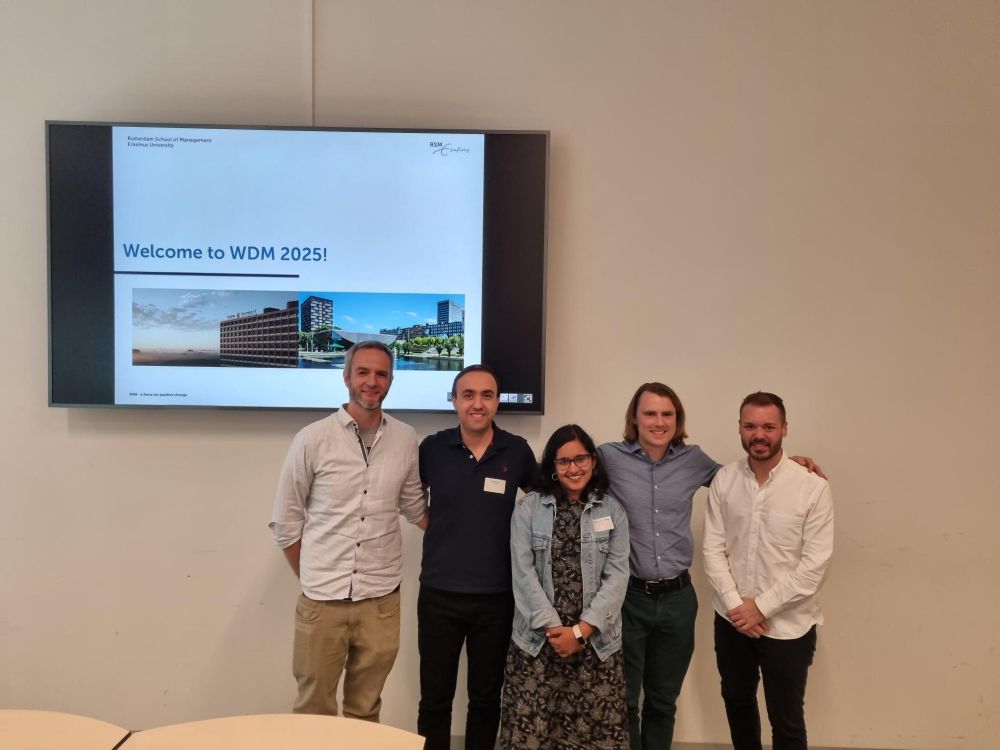
Another year, another amazing Workshop on Digital Markets (WDM)!
Thank you to all the presenters, discussants, and committee members for making this workshop thrive once again.
Looking forward to the Tilburg edition next year!
13.05.2025 14:29 — 👍 1 🔁 0 💬 0 📌 0
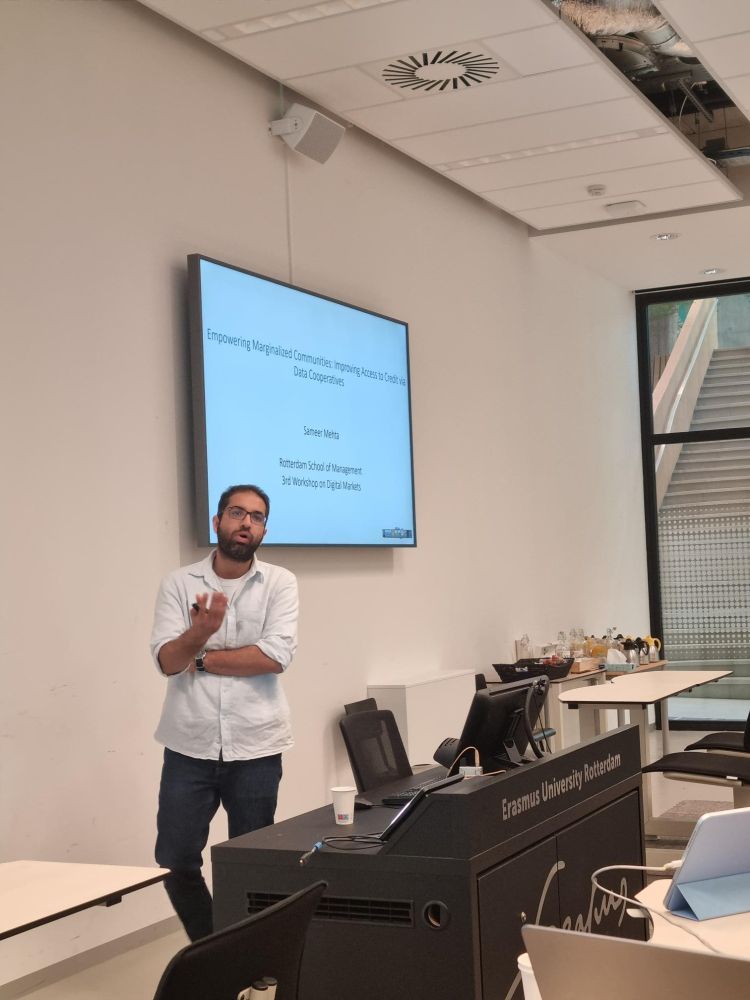
Last (but not least), Sameer Mehta is up on data cooperatives. Access to credit is challenging for marginalized communities in agriculture in the developing world. He proposes a data layer that pools farmers' data to facilitate lending. What amazing work to wrap up the workshop!
13.05.2025 10:25 — 👍 2 🔁 0 💬 1 📌 0
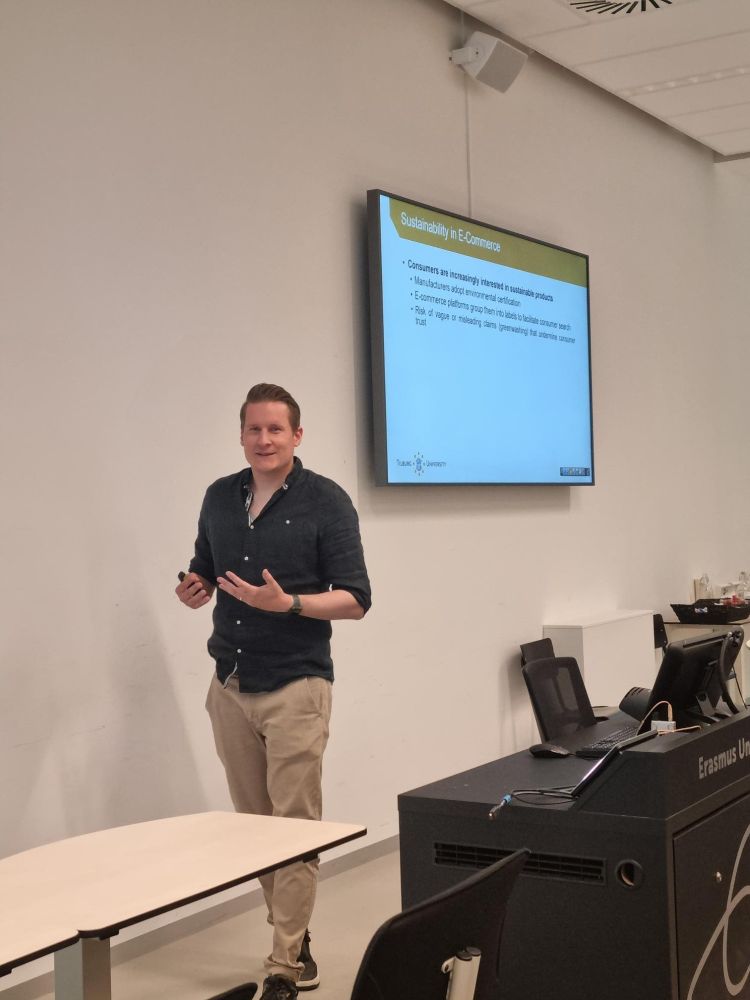
Max Pachali is up next on sustainability in e-commerce. Sustainable products are on the rise, as are greenwashing and misleading claims. They investigate the impact of disclosing credible sustainability claims on sales. Super interesting paper!
13.05.2025 10:05 — 👍 2 🔁 0 💬 1 📌 0
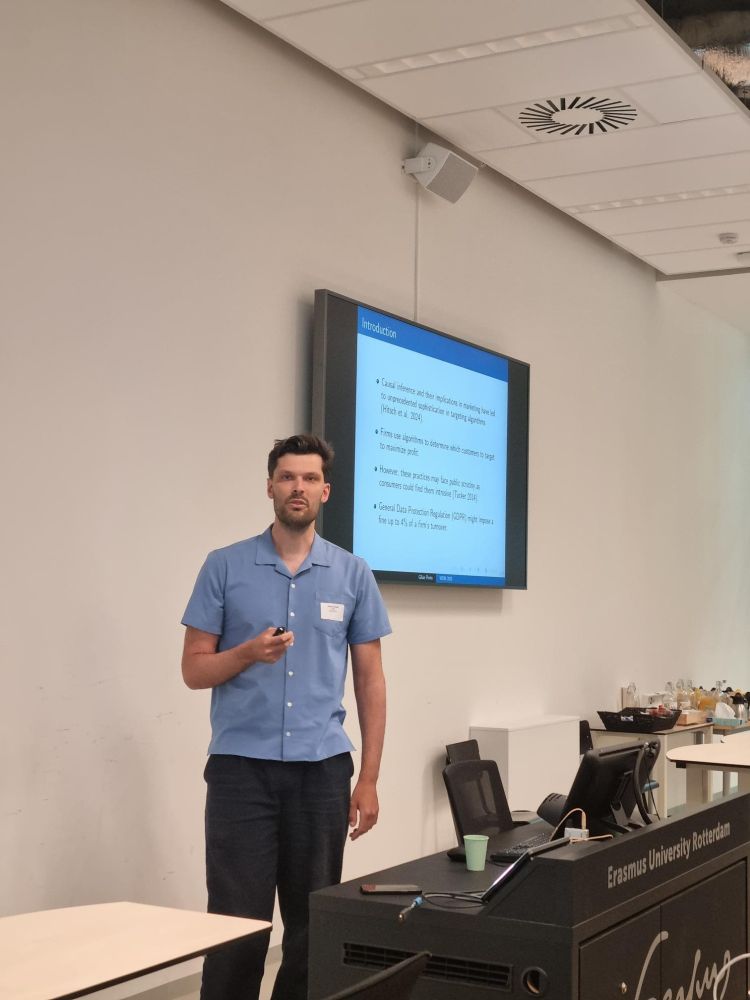
Gillian Ponte kick-starts the last session on privacy risks from targeting decisions. They propose targeting strategies that satisfy differential privacy and protect privacy risk. The later the differential privacy is applied in targeting, the higher the profits. Amazing work!
13.05.2025 09:52 — 👍 1 🔁 0 💬 1 📌 0
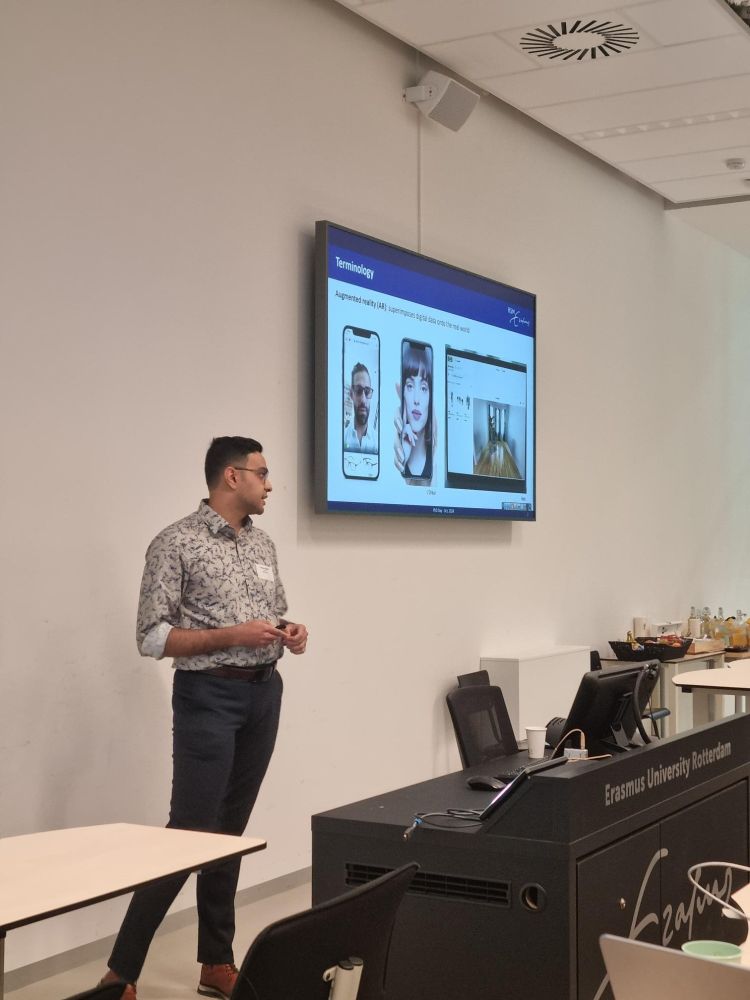
Danial Hayati closes the morning session on augmented reality. They show that AR reduces perceived fit uncertainty, thus could reduce product returns, but can also cause misleading information due to technological constraints. Nicely conducted experiments and moderation analyses!
13.05.2025 08:49 — 👍 1 🔁 0 💬 1 📌 0
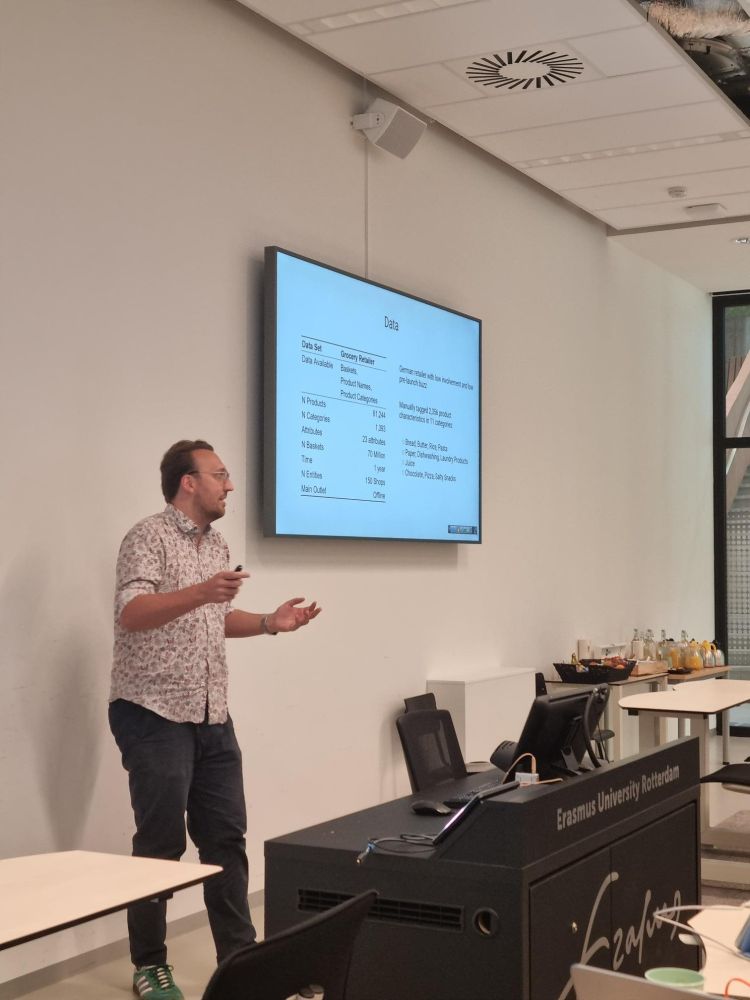
Maximilian Kaiser is next on product embeddings for new product sales prediction. He shows that their method performs better, relies on fewer assumptions about important product attributes and requires less data collection effort, hence it's highly scalable. Super cool method!
13.05.2025 08:19 — 👍 1 🔁 0 💬 1 📌 0
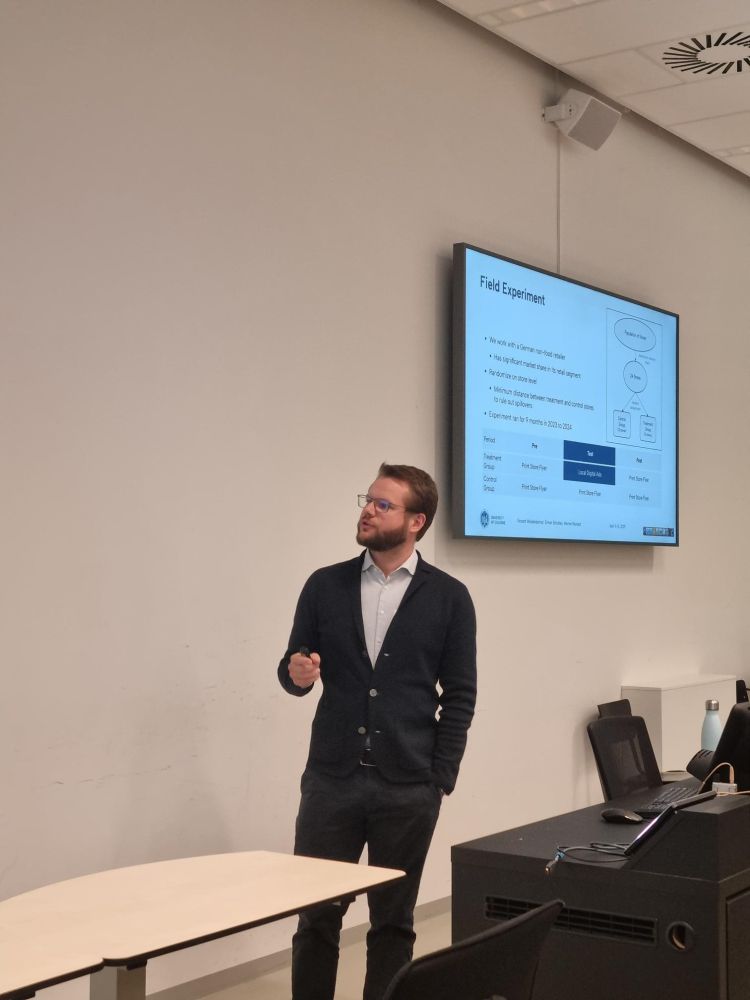
Day 2 starts with Simon Schulten on print flyers. They examine the impact of switching from print store flyers to digital ads on revenue and visits through a randomized controlled trial with a large retailer. Turns out the print flyers work better. Very convincing evidence!
13.05.2025 08:01 — 👍 3 🔁 1 💬 1 📌 0
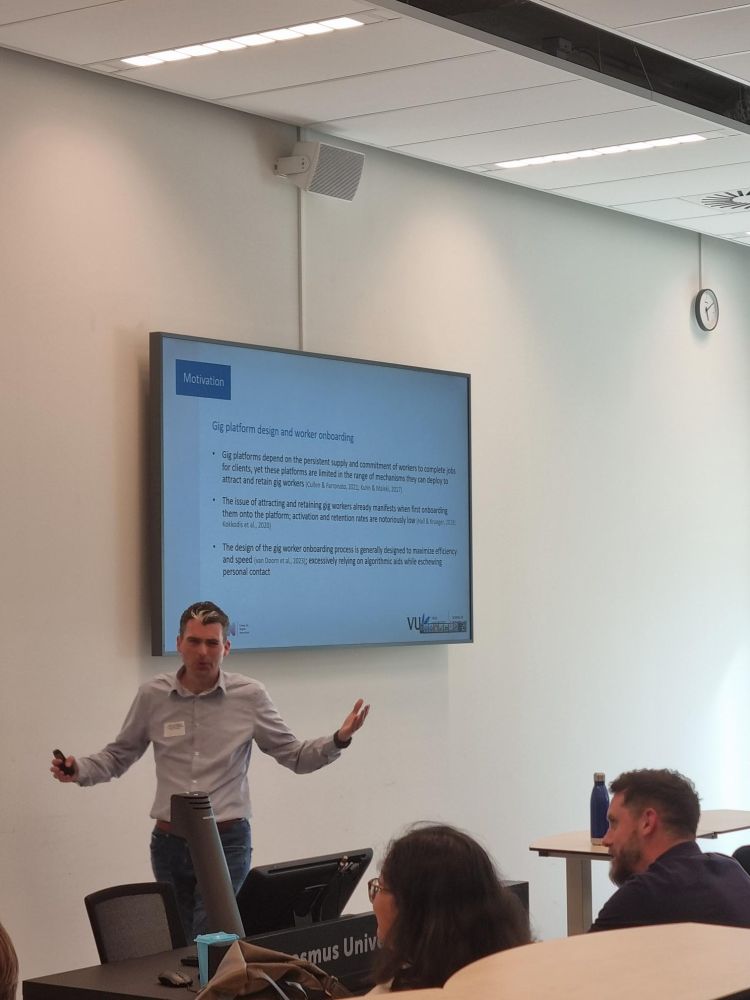
We wrap up today with Joey van Angeren @JoeyVanAngeren on gig economy. Leveraging a natural experiment, they find that a personal phone call with a platform representative increases the number of jobs and revenue for workers. Great paper to wrap up the day and see you tomorrow!
12.05.2025 15:10 — 👍 2 🔁 0 💬 1 📌 1
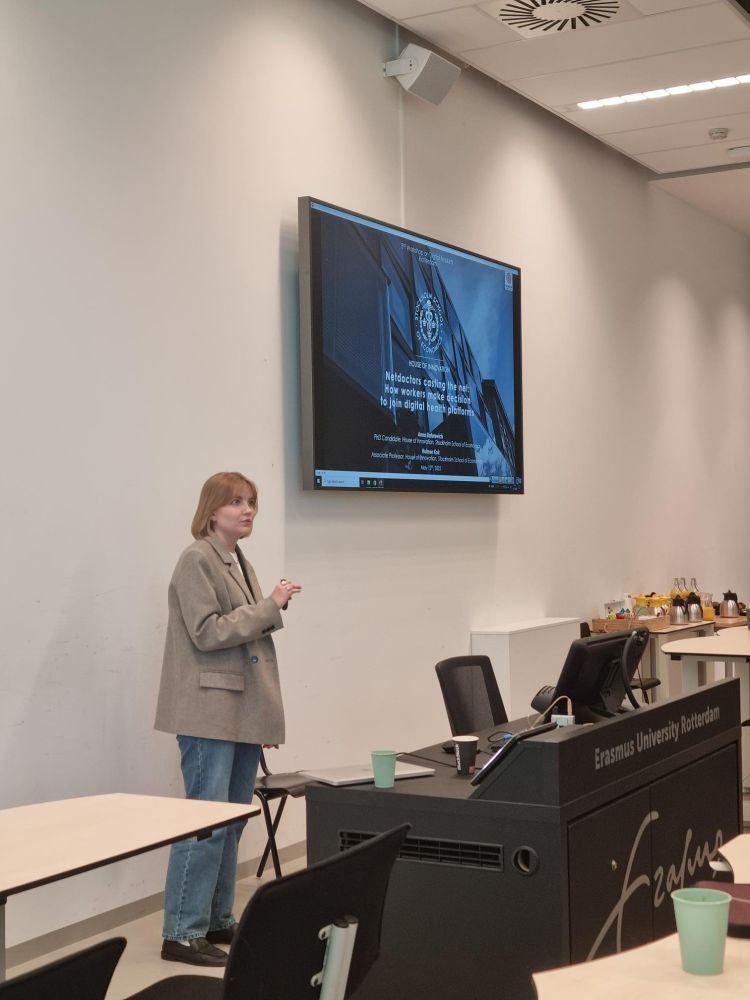
Next is Anna Baturevich on digital platforms. Through a choice-based conjoint experiment on Prolific (meta alert: studying platforms within a platform), the authors examine the decision-making process for joining digital health platforms. Super cool project!
12.05.2025 14:55 — 👍 2 🔁 0 💬 1 📌 0
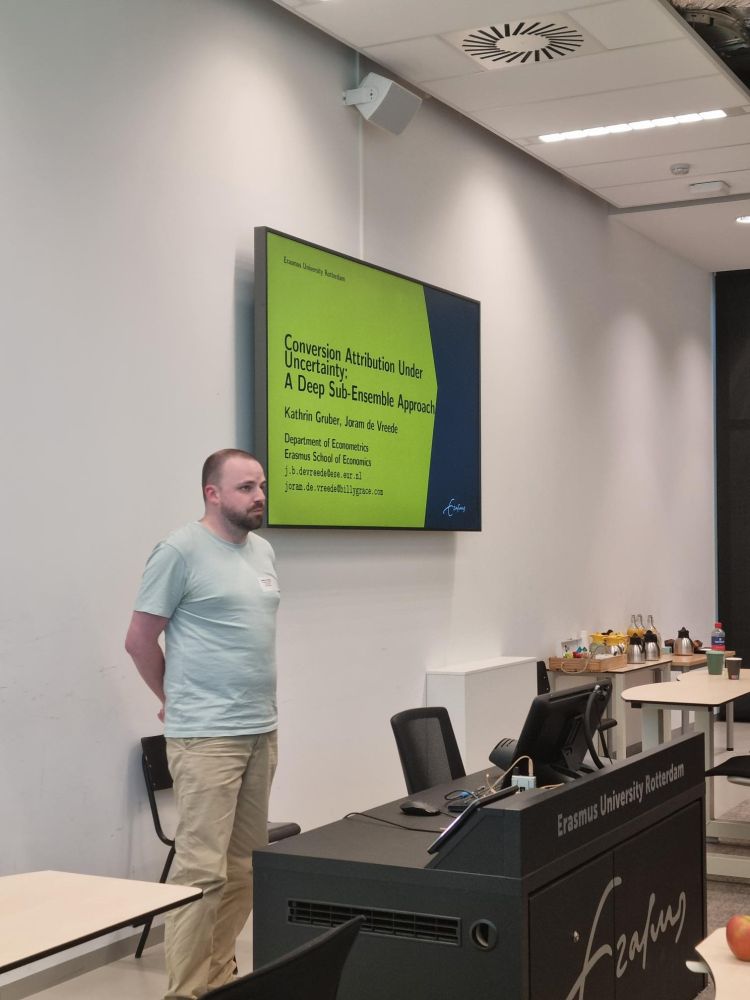
Today's last session starts with Joram de Vreede. He presents a transformer-based machine learning architecture optimized for multi-touch conversion attribution in online digital campaigns, with a feed-forward attention mechanism. Very rigorous work.
12.05.2025 14:17 — 👍 2 🔁 0 💬 1 📌 0
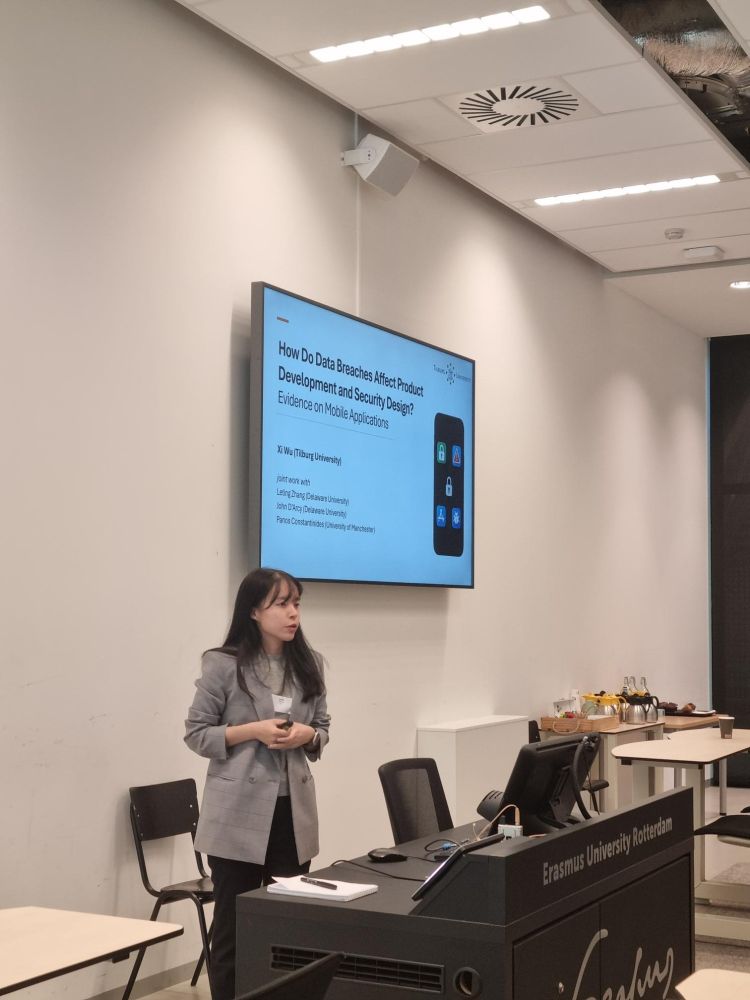
Xi Wu is up next on data breaches. Following a breach, firms cut back on data collection to reduce risk, but face pressure to improve services. Examining mobile app markets, they find that firms increase security investment but maintain data collection. Super interesting project!
12.05.2025 13:22 — 👍 2 🔁 0 💬 1 📌 0
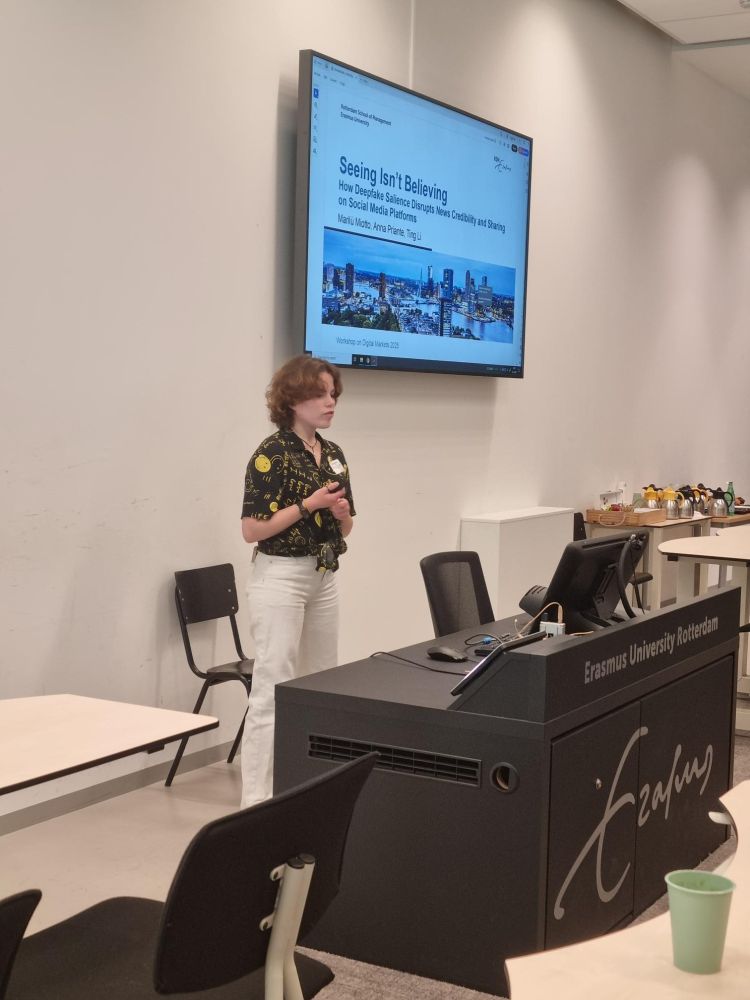
After lunch, we are back with Marilù Miotto on a timely topic: Deepfakes. Her study dives deep into how deepfakes affect news credibility and sharing. Findings reveal that labeling content as deepfake can reduce the credibility of non-labeled content. Very cool work!
12.05.2025 12:51 — 👍 2 🔁 0 💬 1 📌 0
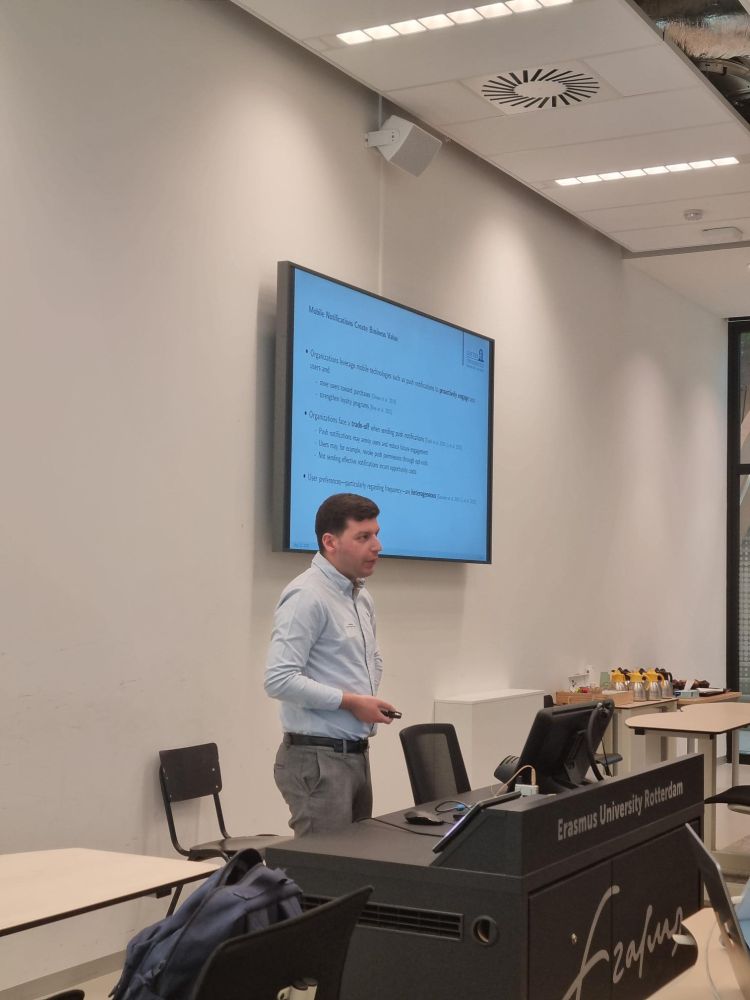
Before lunch, Arda Guler (from Goethe Frankfurt, not from Real Madrid) closes the session with personalized mobile push notifications. In a collaboration with industry partner Payback, they find that causal targeting can improve the effectiveness of mobile push notifications.
12.05.2025 11:00 — 👍 1 🔁 0 💬 1 📌 0
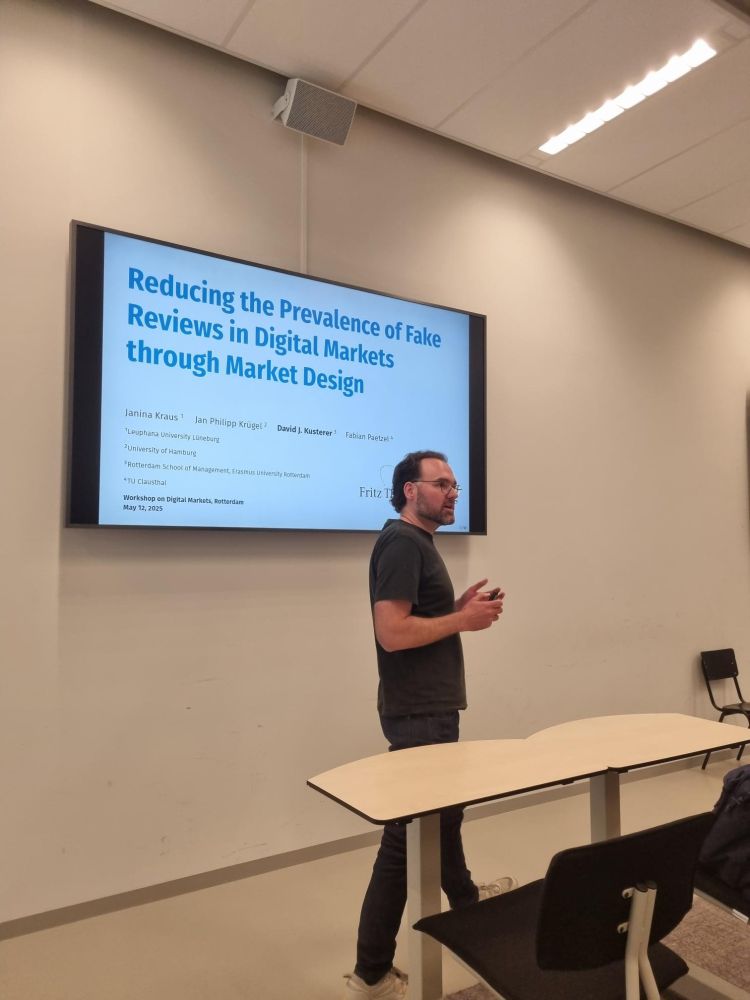
Next, David Kusterer @davidkstrr.bsky.social presents his work on fake reviews. Leveraging a lab experiment, they design a feedback system with reduced incentives for sellers to buy fake reviews. Spoiler alert: Displaying all ratings and inspection seem to reduce fake reviews. Cool project!
12.05.2025 10:44 — 👍 1 🔁 0 💬 1 📌 1
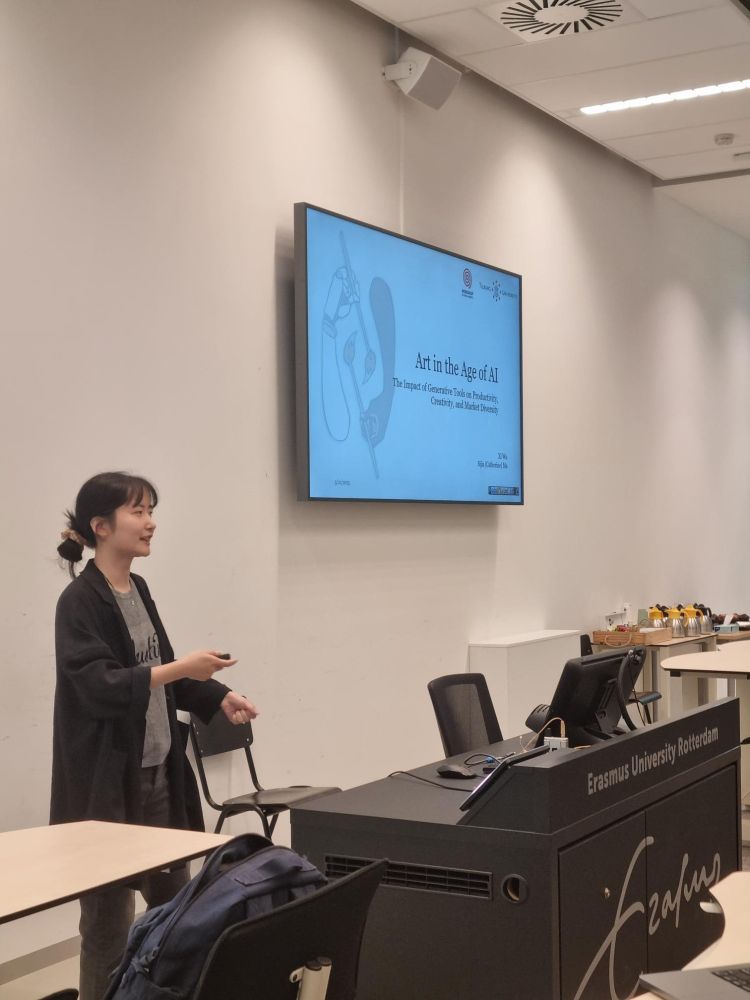
Sijia (Catherine) Ma is up next, presenting her recent work on the impact of image-generating AI on artistic productivity and market diversity. They find that although individual productivity increases, the overall market becomes more similar. Interesting paper!
12.05.2025 10:28 — 👍 2 🔁 0 💬 1 📌 0
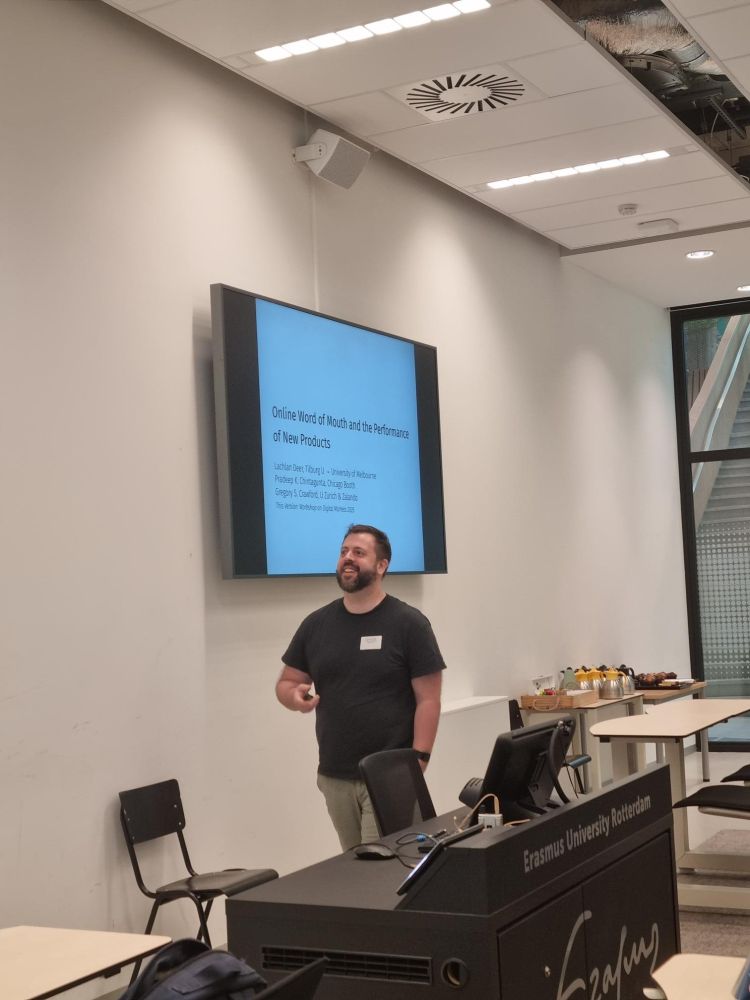
Lachlan Deer @lachlandeer.bsky.social closes the morning session with a structural model that quantifies online word-of-mouth to see how large an effect social media has on new movies. Turns out the impact of social media on demand is smaller than currently perceived. Super promising project!
12.05.2025 09:28 — 👍 2 🔁 0 💬 1 📌 0
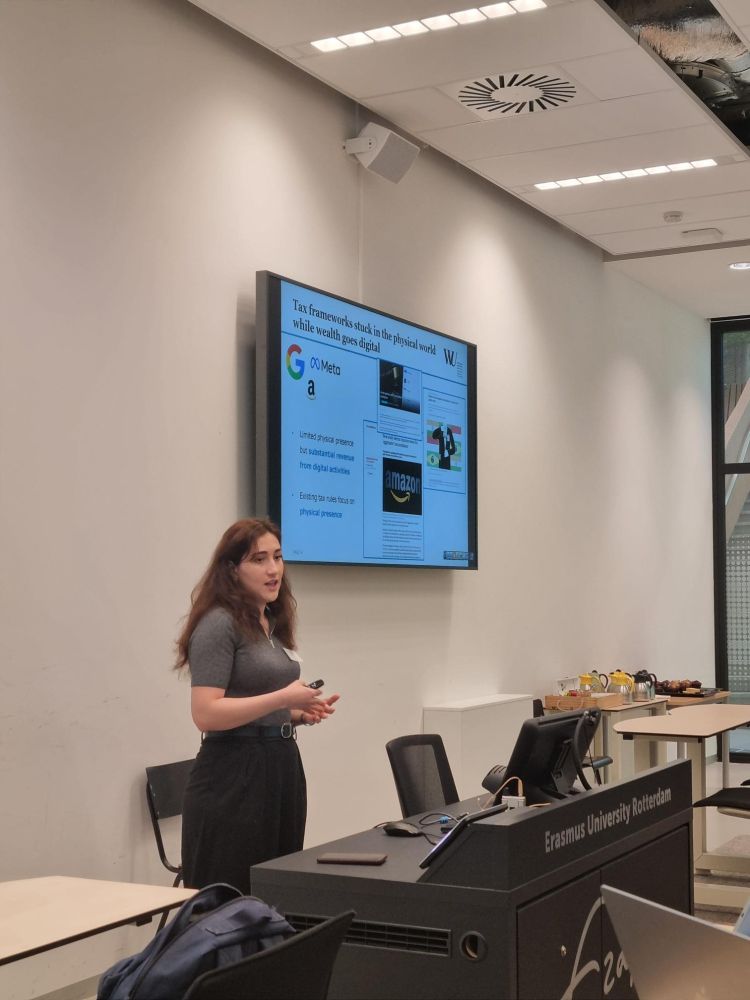
Next up is Isin Acun, on Digital Services Taxes recently introduced in Europe. Some "Big Tech" companies absorbed this tax internally, while others passed it through to advertisers. The authors investigate how advertisers strategically respond. Really interesting work.
12.05.2025 09:02 — 👍 2 🔁 0 💬 1 📌 0
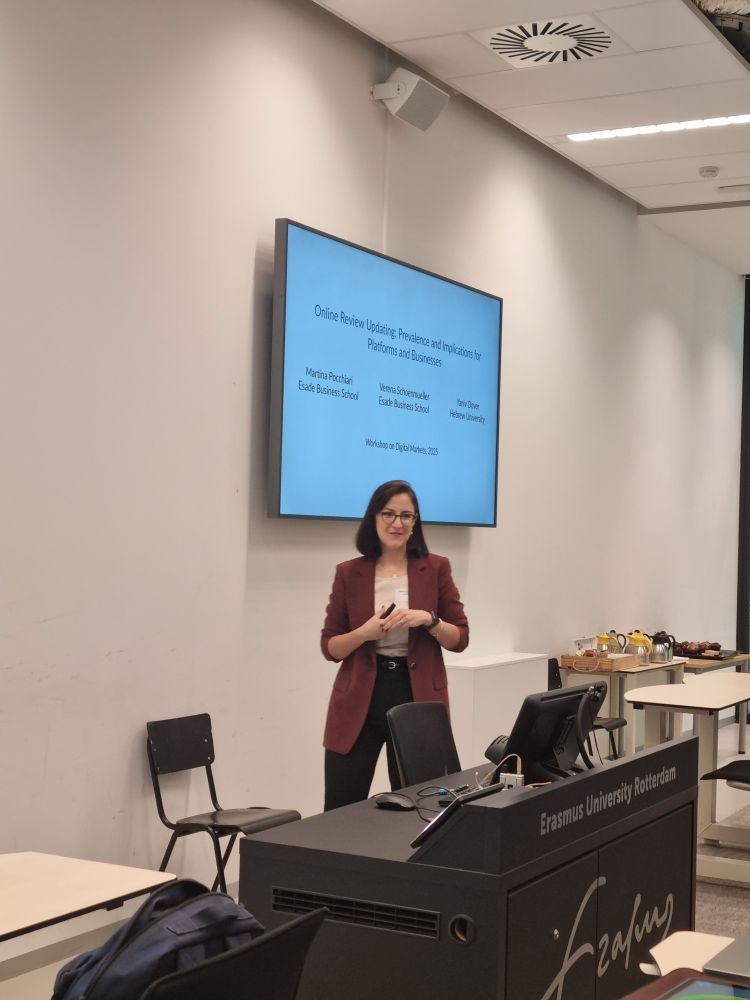
We start with Martina Pocchiari @martinapocchiari.com
, on online review updating. Leveraging a field experiment from PissedConsumer (seriously), they aim to answer when to ask for an update: Early to increase the likelihood, or late to benefit from “time is an ultimate healer". Cool project!
12.05.2025 08:32 — 👍 3 🔁 1 💬 1 📌 0
Workshop on Digital Markets (WDM) 2025 is happening today and tomorrow, proudly presented to you by Tilburg & Erasmus University's Marketing and IS groups. I will be live-tweeting the amazing line-up of speakers and really cool discussants and participants. #WDM25
12.05.2025 08:32 — 👍 3 🔁 1 💬 1 📌 1
Our research on resale royalties in NFT marketplaces, recently published in ISR, was featured as a top story in Emerce @emerce.bsky.social! Great to see our paper receiving media attention and reaching broader audiences. Feel free to check out our paper here: pubsonline.informs.org/doi/10.1287/...
17.02.2025 12:26 — 👍 1 🔁 0 💬 0 📌 0
I sincerely thank the editors, Kenneth Cheng and Tianshu Sun, for their valuable comments, and my co-authors Hasan Cavusoglu and Zhiqiang (Eric) Zheng.
Feel free to share with anyone who might be interested in NFTs, digital art, and creator economy! 7/n
19.12.2024 10:26 — 👍 0 🔁 0 💬 0 📌 0
Our underlying mechanism analyses point to overconfidence effects among creators (i.e., those who had successful past sales and more followers) as the primary reason why prices are lower, and a partial ownership effect that drives buyers away from purchasing high-royalty NFTs. 6/n
19.12.2024 10:26 — 👍 0 🔁 0 💬 1 📌 0
(3) Even more interestingly, higher royalty rates decrease market liquidity and increase time-to-sale despite low prices. All in all, our paper challenges the conventional wisdom that resale royalties benefit creators. Why does this happen? 5/n
19.12.2024 10:26 — 👍 0 🔁 0 💬 1 📌 0
Our findings reveal some surprising insights: (1) NFT creators tend to reduce primary sale prices with higher royalty rates, hoping for future royalty income. (2) However, these lower initial prices aren't offset by royalty payments within 4 years. 4/n
19.12.2024 10:26 — 👍 0 🔁 0 💬 1 📌 0
It's even more relevant now that NFTs can automatically program royalty payments for digital artwork creators. OpenSea recently announced it would stop royalty enforcement, which has further fueled the long-standing debate between creators and platforms. 3/n
19.12.2024 10:26 — 👍 1 🔁 0 💬 1 📌 0
In this study, we empirically investigate whether resale royalties actually benefit creators and platforms. First introduced in 1920s France, artist royalties have been a huge subject of debate for over a century. 2/n
19.12.2024 10:26 — 👍 1 🔁 0 💬 1 📌 0
Resale Royalty in Non-Fungible Token Marketplaces: Blessing or Burden for Creators and Platforms? | Information Systems Research
Excited to share our paper - "Resale Royalty in Non-Fungible Token Marketplaces: Blessing or Burden for Creators and Platforms?" - which was just published in Articles in Advance at Information Systems Research! Read the full paper here: doi.org/10.1287/isre... 1/n
19.12.2024 10:26 — 👍 2 🔁 0 💬 1 📌 0
Postdoctoral Researcher at University of Wuerzburg | PhD from DICE @dice-hhu.bsky.social @hhu.bsky.social | chess player (WFM) | 🇪🇺 | https://www.alisa-frey.de
Associate professor at UCLA Anderson, works on IO, marketing etc. Temporary Parisian.
bretthollenbeck.com
Assistant professor of marketing @esade.edu 🇪🇸
Previously: @NUSbiz🇸🇬 @rsmerasmus.bsky.social 🇳🇱
Studying user-generated content, digital marketing, economics of digitization. Cat content guaranteed.
VIEWS ARE MY OWN.
🔗 https://www.martinapocchiari.com/
Associate Professor at the KIN Center for Digital Innovation, School of Business and Economics, Vrije Universiteit Amsterdam | Research focuses mainly on platforms | Has Peter's anomaly
Market design of the digital economy, esp. feedback systems, contract theory, and personnel economics.
Assistant Professor of Marketing at RSM
https://djkusterer.github.io
Akademisches Raten an der @unicologne.bsky.social
Postdoc in Marketing, PhD in Behavioral Economics
Quant Marketing AP at @unimelb. Researching Digital Markets, Social Networks, and Mental Health
Back in 🇦🇺 via 🇳🇱, 🇺🇸, 🇨🇭 and 🇬🇧.
Web: lachlandeer.github.io
Twitter/X: lachlandeer
ACM SIGecom encourages research and advanced applications at the interface between economics and computer science. See you at EC'26 #ACMEC26!
Asst Prof of Information Systems at Emory University
parasurama.github.io
Assistant Professor of IS at Nova SBE
Assistant Professor of Management Science at Chapman University, Digital Fellow at Stanford Digital Economy Lab.
JEL: J24
she/her/hers
Academic @esadebsls.bsky.social I research #OpenSource, #Open #innovation, material #agency, #governance of #OSS
Associate Professor @ Emory University. Interested in technology, online marketing & digital strategy. ex-Googler, NYU alumnus &
@Giannis_An34's biggest fan!
Assistant Professor, Boston University. Economics of Digitization | Privacy | Consumer Data | Algorithms
More here: tesarylin.github.io
Asst Prof of Information Systems @ Augsburg U
---
Data-driven decisions in healthcare, esp EMS and pharma. UMN PhD, Georgia Tech Engineer, UMD MBA, USMC.
David Austin Professor, MIT; Director @MIT_IDE; Founder, Manifest Capital & Milemark Capital; Hype Machine Author Digital Insider Pod TED Talk
Management Prof @USCmarshall & @LSEmarshall. Focus: luck, serendipity, innovation, leadership. Author @PenguinRandomHouse: CONNECT THE DOTS / THE SERENDIPITY MINDSET (https://bit.ly/3Q1tEFO)
Assistant professor of digital transformation and society @uni-muenster.de with research interests in digital media and AI systems

















